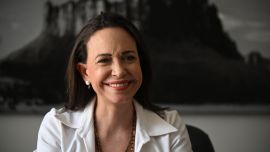Fireworks erupted in El Salvador's capital Sunday as President Nayib Bukele claimed a massive first-round re-election victory on the back of a "war" on gangs credited with slashing homicide rates in the violence-weary country.
Bukele, 42, claimed to have won more than 85 percent of the presidential vote and his party Nuevas Ideas 58 of the 60 seats in parliament.
In a victory speech given to cheering, flag-waving crowds from a balcony of the National Palace before final official results were announced, Bukele claimed his win represented "the biggest difference between first place and second place in the history" of democratic presidential elections anywhere.
And he said El Salvador would be the first country with "a one-party system in a democracy."
Partial results released by the Supreme Electoral Tribunal late Sunday, as Bukele was speaking, showed that nearly 83 percent of votes cast were for the president, streaks ahead of five competitors.
Bukele had already claimed a "record" victory on X, formerly Twitter, hours before, as supporters set off fireworks in several areas of the capital, and hundreds gathered on a central square chanted "Nayib! Nayib!"
"We are more than happy with this victory: we will have Bukele for five more years," Lorena Escobar, a 38-year-old nurse, told AFP.
Bukele polls as Latin America's most popular leader, mainly for his roundup of more than 75,000 presumed gangsters under a state of emergency that entered into force nearly two years ago.
El Salvador's fearsome gangs had taken some 120,000 civilian lives in three decades, according to the government, which says criminal groups controlled 80 percent of the country when Bukele took power in 2019.
Last year, the country that was once one of the most dangerous in the world, saw the murder rate plummet to its lowest level in three decades – far below the global average.
'Cancer of gangs'
Shortly after voting Sunday, Bukele batted away criticism of his rights record and boasted he had cured the Central American country of a "cancer" of gangs.
"Why do we have the biggest incarceration rate in the world? Because we... changed the murder capital of the world, the world's most dangerous country, into the safest country in the Western Hemisphere," he told reporters in English.
"The only way to do that is to arrest all the murderers."
Activists say many innocents – including minors – have been caught up in the dragnet, locked up in inhumane conditions and even subjected to torture.
Thousands are held in a brand-new prison – plugged as the largest in the Americas – which the president had built in a matter of months.
"We did surgery, we are in radiotherapy, and we will leave healthy without the cancer of gangs," insisted Bukele, who has ironically adopted the moniker "dictator" sometimes used to describe him.
The president added that: "our police made a couple of mistakes, of course they did, that's why our judicial system has been freeing innocent people" – some 7,000 to date.
'State violence'
In December, an Amnesty International report raised alarm over the "gradual replacement of gang violence with state violence," pointing to arbitrary arrests.
But for most Salvadorans, this seems to be a not-too-pressing issue.
"Things were ugly before," Sandra Burgos, 68, told AFP in La Campanera – a once notoriously violent neighbourhood of San Salvador which in the time of gang rule was divided into numerous no-go areas.
"Now we are fine. We can move around... before it was not possible."
Bukele's very candidacy was controversial, having been made possible by a loyalist Supreme Court ruling allowing him to bypass a constitutional ban on successive terms.
This came after the Bukele-aligned legislature replaced top judges and the attorney general – both institutions he had clashed with.
There are also worries about worsening antagonism towards critics and independent media, and of opaque public accounting.
El Salvador's ailing economy will be a major challenge for Bukele's second term, with high public debt and the president's investment of taxpayer money in bitcoin widely seen as a failed gambit.
Nearly 30 percent of Salvadorans lived in poverty in 2022, according to the UN's Economic Commission for Latin America and the Caribbean.
Voting in El Salvador is not compulsory, and turnout was just over 50 percent in 2019, when Bukele also won in the first round with 53 percent of the vote.
China, Guatemala and Panama have sent messages of congratulations.
related news
by Mariëtte Le Roux, AFP























Comments